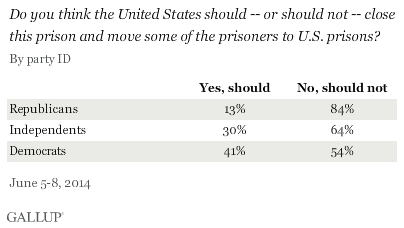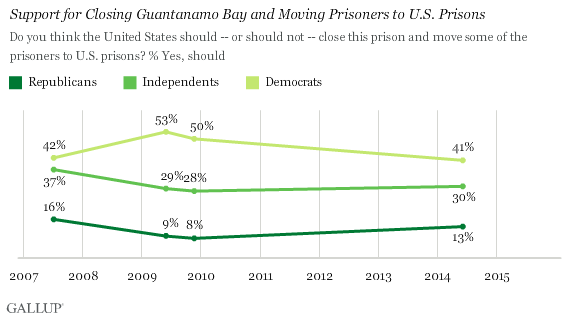WASHINGTON, D.C. -- Twenty-nine percent of Americans support closing the terrorist detention camp at Guantanamo Bay, Cuba, and moving its prisoners to U.S. prisons, while two in three (66%) oppose the idea. Despite the recent controversy surrounding the release of five Taliban prisoners held at Guantanamo Bay in exchange for U.S. Army Sgt. Bowe Berghdal's release from Afghanistan, Americans' views have barely budged since 2009.

These results are from a June 5-8 Gallup poll conducted days after the release of Sgt. Bergdahl. Gallup found that Americans are divided on the wisdom of negotiating with terrorist groups to secure the release of Americans prisoners.
President Barack Obama made the closing of Guantanamo Bay a part of his 2008 campaign platform, but he has yet to do so. However, he recently reiterated his desire to close the prison at West Point graduation ceremony. Despite the president's continued commitment to its closure, Americans' views have not changed much in the four times Gallup has asked them about this issue.
Republicans remain more likely than Democrats to oppose closing the detention facility, although the majority of Democrats remain opposed.

A consistent minority of Republicans have supported closing the prison since 2007, when 16% felt the prison should be closed. Republicans were even less likely to support the prison's closure by 2009, as Obama continued his pledge to close the facility, reaching its lowest at 8% in November of that year.
Like Republicans, independents' support for closing the prison has fallen since 2007, from 37% in 2007 to 28% by November 2009.
As of this year, Democrats have shown their lowest support for closing the prison at Guantanamo Bay. Currently, 41% support the idea, while 54% oppose it. Previously, Democrats were split in their views, sometimes differing by as little as two percentage points.

Bottom Line
Though President Obama has long backed plans to close the prison at Guantanamo Bay, he did not have the support of Americans on the issue when taking office in 2009. Today, he still does not have their support, even among those in his own party.
According to a spokeswoman for the National Security Council, 17 inmates from the detention facility have been moved out in the past 13 months, including the five Taliban officials who were recently swapped for Bergdahl. This leaves 149 remaining detainees at the facility, and the White House is currently exploring plans to transfer more of them on a case-by-case basis.
Though public opinion on what to do with the facility has been consistent, it could change as prisoner numbers dwindle. Further, as more information regarding the Bergdahl case emerges -- including whether the recently freed Taliban detainees re-emerge as terror threats to the U.S. -- ideas about what to do with Guantanamo Bay could shift.
Survey Methods
Results for this Gallup poll are based on telephone interviews conducted June 5-8, 2014, with a random sample of 1,027 adults, aged 18 and older, living in all 50 U.S. states and the District of Columbia.
For results based on the total sample of national adults, the margin of sampling error is ±4 percentage points at the 95% confidence level.
Interviews are conducted with respondents on landline telephones and cellular phones, with interviews conducted in Spanish for respondents who are primarily Spanish-speaking. Each sample of national adults includes a minimum quota of 50% cellphone respondents and 50% landline respondents, with additional minimum quotas by time zone within region. Landline and cellular telephone numbers are selected using random-digit-dial methods. Landline respondents are chosen at random within each household on the basis of which member had the most recent birthday.
Samples are weighted to correct for unequal selection probability, nonresponse, and double coverage of landline and cell users in the two sampling frames. They are also weighted to match the national demographics of gender, age, race, Hispanic ethnicity, education, region, population density, and phone status (cellphone only/landline only/both, and cellphone mostly). Demographic weighting targets are based on the most recent Current Population Survey figures for the aged 18 and older U.S. population. Phone status targets are based on the most recent National Health Interview Survey. Population density targets are based on the most recent U.S. census. All reported margins of sampling error include the computed design effects for weighting.
In addition to sampling error, question wording and practical difficulties in conducting surveys can introduce error or bias into the findings of public opinion polls.
View methodology, full questions results, and trend data.
For more details on Gallup's polling methodology, visit www.gallup.com.
